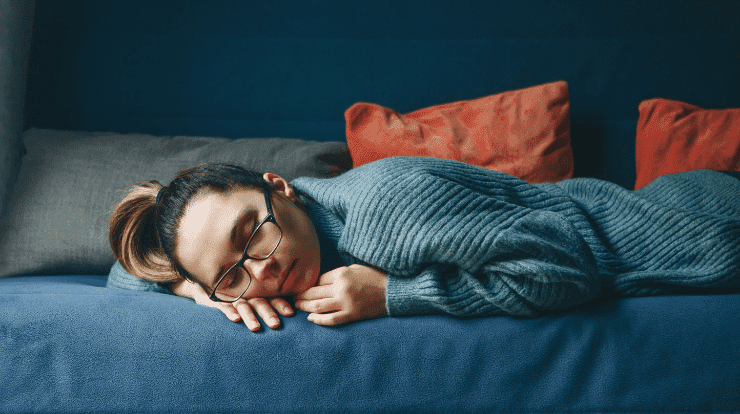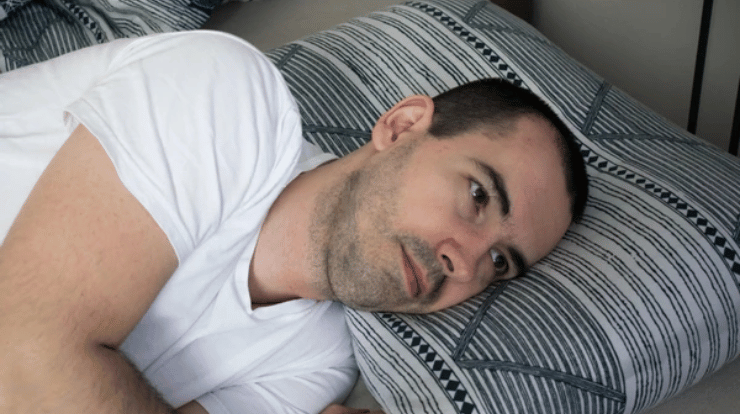
We all know the feeling of a good night’s sleep. We wake up feeling rested and refreshed, ready to take on the day. But what exactly happens during sleep that allows us to feel this way? It turns out, quite a bit! Sleep is essential for our physical and mental health, and it is divided into four distinct stages: drowsiness, light sleep, deep sleep, and REM (rapid eye movement) sleep. Of these four stages, deep sleep is the most important.
What is deep sleep and how Deep Sleep Works?
During deep sleep, our bodies are able to rest and heal. This is because our heart rate slows down and our blood pressure drops. Our breathing becomes regular and slows as well. Muscle relaxation also occurs during deep sleep, which is why we sometimes experience twitches during this stage. In addition, the hormone melatonin is released, which helps to regulate our body temperature and prepare us for the next day.
Deep sleep is important for both our physical and mental health. Physically, deep sleep helps to boost our immune system, repair tissue damage, and reduce inflammation. Mentally, deep sleep helps to improve our mood, memory, and concentration. It also reduces stress and anxiety levels. Deep sleep is essential for keeping our bodies and minds healthy!
How much deep sleep do you need by age?
The amount of deep sleep you need varies by age. In general, young adults need around 7-9 hours of sleep each night, including around 1-2 hours of deep sleep. However, as you age, you may need less deep sleep. For example, older adults may only need around 5-6 hours of sleep each night, including around 30-60 minutes of deep sleep.
As we age, our sleep patterns often change. Older adults tend to sleep less overall, and they may also have more difficulty achieving deep sleep. This is why it’s important to make sure that you’re getting enough sleep each night, no matter what your age. If you’re not getting enough deep sleep, it can lead to problems with fatigue, focus, and overall health.
Benefits of deep sleep
- Deep sleep helps to promote physical health.
- Deep sleep is important for emotional well-being.
- Deep sleep supports cognitive function and memory.
- Deep sleep aids in the healing process.
- Deep sleep can help improve athletic performance.
- Deep sleep can help reduce stress and anxiety.
- Deep sleep can improve the quality of your skin.
- Deep sleep can help you live longer.
How to increase deep sleep?
Improve the quality of your sleep with these 10 effective tips. From establishing a consistent sleep schedule to reducing fluid intake before bedtime, learn how to increase deep sleep and get a better night’s rest.
Here are 10 tips for increasing deep sleep, with more detail
1. Stick to a consistent sleep schedule:
One of the best ways to improve the quality of your sleep is to establish a consistent sleep schedule. This means going to bed and waking up at the same time every day, including on weekends. By doing this, you’ll regulate your body’s circadian rhythm and make it easier to fall asleep and stay asleep.
2. Create a sleep-conducive environment:
Your sleep environment plays a crucial role in the quality of your sleep. To increase deep sleep, create a sleep environment that is cool, dark, and quiet. Keep your bedroom at a temperature between 60-67°F, invest in blackout curtains, earplugs, or a white noise machine to reduce distracting noises and light.
3. Exercise regularly:
Regular physical activity can help you fall asleep faster and improve the quality of your sleep, including deep sleep. However, it’s important to finish exercising at least three hours before bedtime, as exercising too close to bedtime can make it difficult to fall asleep.
4. Limit exposure to screens:
The blue light emitted by electronic devices, such as smartphones, laptops, and televisions can suppress the production of melatonin, a hormone that helps regulate sleep. Try to limit your exposure to screens for at least an hour before bedtime, and consider using a blue light-blocking screen protector or application to reduce the amount of blue light emitted by your devices.
5. Avoid caffeine and alcohol:
Both caffeine and alcohol can disrupt the quality of your sleep, especially deep sleep. Caffeine is a stimulant that can interfere with sleep, while alcohol can cause you to wake up during the night. Try to avoid both of these substances in the hours leading up to bedtime.
6. Establish a relaxing bedtime routine:
Establishing a relaxing bedtime routine can help you wind down and prepare your body for sleep. This can include activities such as reading a book, taking a warm bath, or practicing deep breathing exercises.
7. Use a comfortable mattress and pillow:
Investing in a comfortable mattress and pillow can make a significant difference in the quality of your sleep. Choose a mattress that provides adequate support and comfort, and consider using a pillow that helps align your neck and spine.

8. Limit naps during the day:
While napping can help improve alertness and energy levels during the day, napping too close to bedtime can make it difficult to fall asleep and disrupt the quality of your sleep. Try to limit naps to 20-30 minutes in the early afternoon, and avoid napping in the evening.
9. Avoid large meals close to bedtime:
Eating a large meal close to bedtime can cause indigestion, heartburn, and other digestive issues that can make it difficult to fall asleep and stay asleep. Try to avoid heavy meals in the evening, and stick to a light snack if you need to eat before bed.
10. Reduce fluid intake before bedtime:
Drinking large amounts of fluid close to bedtime can cause you to wake up during the night to use the bathroom, disrupting the quality of your sleep. Try to reduce fluid intake for several hours before bedtime, and avoid diuretics such as caffeine and alcohol.
By incorporating these tips into your daily routine, you can increase deep sleep and improve the overall quality of your rest. Remember, it’s important to make changes gradually and be patient as your body adjusts to these changes.

Lack of deep sleep symptoms
- Tired during the day, not rest: Most people need around eight hours of sleep per night. If you’re not getting enough deep sleep, you may find yourself feeling exhausted during the day, no matter how much time you spend in bed.
- Easy to get irritated or angry: When you’re sleep-deprived, it’s harder to control your emotions. You may find yourself getting impatient or angry more easily than usual.
- Difficulty concentrating or making decisions: It’s tough to focus when you’re tired. If you’re not getting enough deep sleep, you may have trouble concentrating at work or school, and making decisions may be harder than normal.
- Feeling sad or depressed: Lack of sleep can affect your mood, leaving you feeling down or even depressed.
- Craving carbohydrates and sweets: One sign that you’re not getting enough deep sleep is an increase in cravings for carbs and sugar. When you’re exhausted, your body is looking for quick sources of energy, which it finds in high-carb foods.
- Gaining weight: If you’re not getting enough deep sleep, it can lead to weight gain. That’s because when you’re tired, you’re more likely to make poor food choices and eat more calories than you need.
- Suffering from headaches or body aches: Headaches and muscle pain are common symptoms of lack of sleep. When you don’t get enough rest, your body isn’t able to repair itself as well, which can lead to pain and discomfort.
- Experiencing decreased sex drive: Low libido is a common side effect of sleep deprivation. When you’re exhausted, you probably don’t feel like being intimate with your partner. Plus, lack of sleep can cause hormonal imbalances that can lower your sex drive.
What causes a lack of deep sleep?
There are many potential causes of a lack of deep sleep, including:
- Stress
- Anxiety
- Depression
- Sleep Apnea
- Narcolepsy
- Medications or substances that interfere with sleep (such as caffeine)
- Shift work or jet lag
- An uncomfortable sleep environment
- Sleeping on an irregular schedule
In many cases, a combination of factors may be contributing to a lack of deep sleep. Identifying and addressing the underlying causes can help to improve sleep quality.
Deep Sleep vs REM Sleep: What’s the Difference?
There are two main types of sleep: deep sleep (also known as slow-wave sleep) and REM (rapid eye movement) sleep. Most people cycle through both types several times throughout the night, with deep sleep occurring in the first half of the night and REM taking place in the latter half.
Deep Sleep: Deep sleep is characterized by slow brain waves and is when our bodies do the majority of their repair and restoration work. This includes things like cell regeneration, tissue growth, and hormone production. Deep sleep is essential for physical health, and studies have shown that it also plays a role in everything from immunity to heart health.
REM Sleep: REM sleep is when we do the majority of our dreaming. During this stage, our brain activity quickens and becomes more similar to that of an awake person. Although REM sleep only makes up 20-25% of our total sleep time each night, it’s thought to be crucial for learning, memory formation, and overall mental health.
Why Both Deep Sleep and REM Sleep are Important?
As you can see, deep sleep and REM sleep are both vital for our physical and mental health. And while most people know that getting a good night’s rest is important, many don’t realize just how essential those eight hours (or more!) truly are. So next time you’re struggling to get some shut-eye, remember that a good night’s rest isn’t just important for your health—it’s essential.
Deep sleep vs Light sleep
Deep sleep is when your body is at its most relaxed. Your heart rate slows down and your breathing becomes regular. Light sleep is when your body is still somewhat active. Your eyes may move around, and you may have brief periods of wakefulness. Most people need about seven to eight hours of sleep each night. But some people may need more or less depending on their age, health, and lifestyle. Deep sleep is the most restful type of sleep.
It’s when your body can heal and repair itself. Light sleep is less restful but still important for your overall health. It’s when your brain can process information and consolidate memories. Most people cycle through different stages of light and deep sleep several times during the night. But if you’re sleep-deprived, you may spend more time in light sleep. Deep sleep is important for your physical health. It helps your body heal and repair itself. Light sleep is important for your mental health. It helps you process information and consolidate memories. If you’re not getting enough deep or light sleep, it can affect your physical and mental health.






